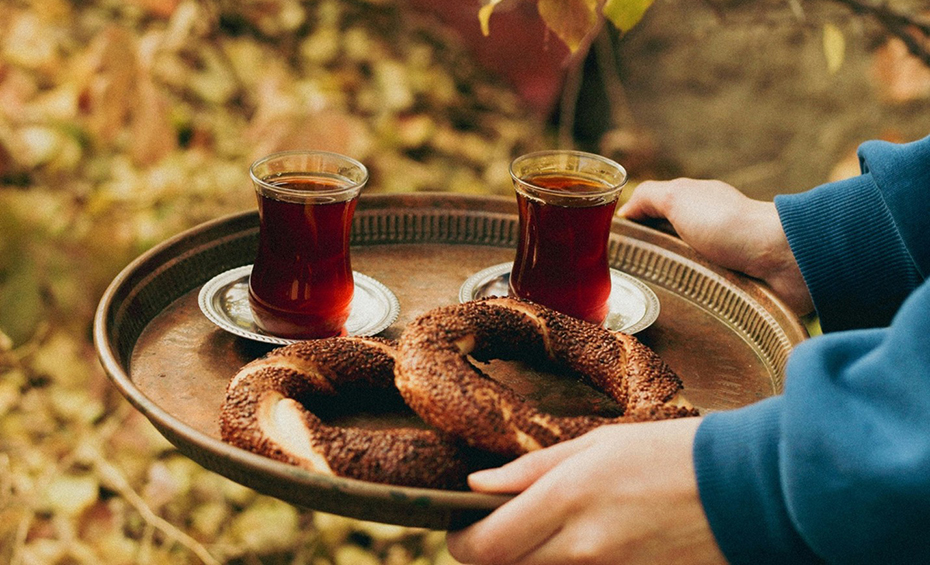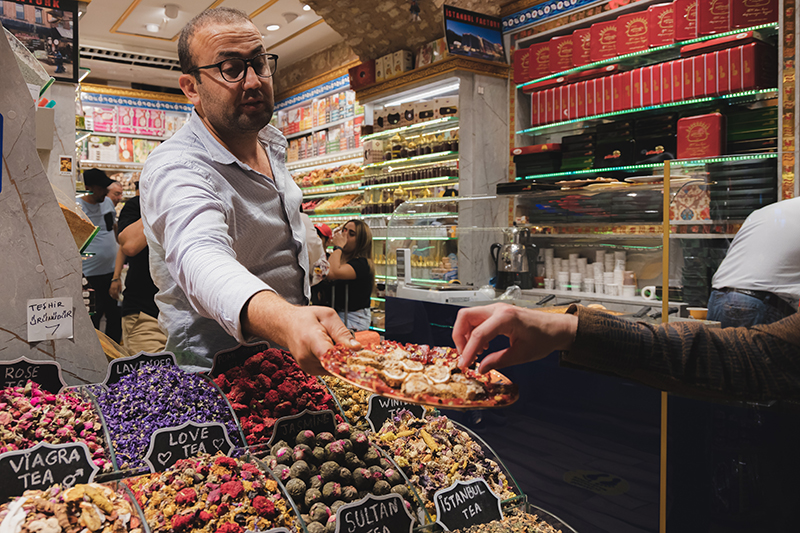POST
February 17 , 2025
Welcome to Türkiye: Hospitality & Traditions
The concept of hospitality, “misafirperverlik”, is woven into the very fabric of Turkish culture through genial traditions and societal norms.

When travelers return from Türkiye, they often speak first not of the grand monuments or ancient ruins, but of the warmth of the Turkish people. As an American who is going on 10 years of living in Türkiye, I can attest that the thread of hospitality runs deep in the fabric of Turkish society. At times edging on performative, but most often genuine, the prevailing practice of putting the guest first is reflected in all social interactions.
When I first came to Istanbul, there were many things I had to get used to (learning to stand my ground in what passed for a line; letting go of my concept of being on time; group dinners that went on for hours, the end only signaled by someone’s suggestion for Turkish coffee), but over the years these ways of living just melted into my own, and many customs I now wouldn’t want to live without (long Sunday Turkish breakfasts; not wearing shoes at home). This is the painful pleasure of cultural immersion, and we can feel it when we really get to know a place in our travels – you can either gain a better appreciation for your own valued traditions or come to adopt something unique and intentional into your own everyday.
Last year, my mom finally came for a long-awaited visit, and it gave me the chance to realize again, through her eyes, some of the local conventions that I once found unusual. If, like her, you've never been to Türkiye before, here's what you should know about Turkish hospitality and the customs you’ll encounter during your visit.
A Welcome Beverage
Your first encounter with Turkish hospitality will likely involve tea. Whether you’re shopping in the Grand Bazaar or visiting a home or office, you’ll be offered çay (pronounced "chai") served in delicate tulip-shaped glasses. This isn’t just a beverage – it’s a ritual of welcome. It’s usually black tea, served with sugar cubes on the side, or you may be offered sweetened apple or pomegranate tea around Istanbul’s Grand Bazaar and Spice Market. Declining tea could be seen as declining friendship, so take a moment to sit and sip. There’s a Turkish saying: "Coffee has a memory of forty years" – in other words, forty years of friendship. The same spirit applies to tea.

“Buyurun” – An Invitation
You’ll hear “buyurun” everywhere in Türkiye, particularly in the bazaars and as you stroll down main shopping streets. It’s a multipurpose word that means “here you go”, “please, go ahead” or “help yourself”. Sellers and restaurant waiters use it to welcome you into a space, and it’s also said when someone offers you a sample to try. It’s like the verbal embodiment of Turkish hospitality.

A Culture of Consideration
Don’t be afraid to ask for help – visitors and lost travelers benefit from the Turkish people’s sense of moral obligation to help others, and locals take special pride in helping visitors experience their culture and city. You might even have someone go out of their way to walk you to your destination.
If you take public transportation, you might notice the society’s deeply ingrained sense of respect for elders. It’s common for younger, more abled passengers to stand and offer their seats to elderly people, pregnant women, or anyone carrying a child. The exchange is so second nature it happens swiftly with easy eye contact and a nod, maybe an encouraging "buyurun". And when some indifferent youth neglects to give up their seat, I’ve seen quite a few eye rolls. Beyond public transport, it’s expected to come to the aid of anyone needing assistance, from helping to carry a stroller up the stairs to offering support on icy winter sidewalks.
Care for Children and Street Friends
In Türkiye, there’s a noticeable community affection for both children and animals. Children are broadly welcomed in restaurants and public spaces – you’ll see shopkeepers offering treats to kids and restaurant staff doting on babies. While this enthusiastic attention might initially unsettle foreign parents, it’s simply part of the culture’s child-friendly nature.
The street animals, particularly cats, have carved out their own place in Turkish urban life. Beloved community cats (often with nicknames) wander freely to take shelter in shop windows, nap on café benches, and wait for scraps at kebab shops and fish markets. In my neighborhood, every coffee shop and bakery on the main street has its own dog that sleepily guards the front sidewalk or lounges under the chairs of customers. You’ll see water bowls outside of buildings, and cat houses dotted around parks and street corners. While not every Turk is an animal lover, there’s a general acceptance of street animals as part of the community. Local municipalities provide basic veterinary care, and many neighborhoods have informal networks of residents who feed and monitor the local strays.

The Art of the Turkish Home Visit
If you’re fortunate enough to be invited into a Turkish home, you can observe some charming customs. First, you’ll notice that everyone removes their shoes at the door. A good host will have house slippers for their guests – I always come prepared with my own slipper socks. Traditional hosts will also steer honored guests to the most comfortable seat and will continuously offer refreshments. You’re sure to hear “afiyet olsun” (enjoy your meal) before eating, and afterward “elinize sağlık” (health to your hands) to thank the cook. This old Turkish saying sums it up: "Misafir on kismet getirir" – a guest brings ten fortunes.

At the Turkish Table
As in most societies, food plays a central role in Turkish hospitality. Meals are social events meant to be lingered over. Don’t be surprised if a simple lunch stretches into hours of conversation. At home dinner parties, guests will be offered the best portions. The table will be filled with far more food that was prepared or ordered than necessary, an example of “bereket” (read more below). If you compliment a food item, your host might insist on sending you home with it or sharing the recipe.
When dining out with Turkish people, you’ll witness the ritualistic dance of “paying the bill”. It’s not really an argument, but a determined, friendly contest over who will pay. This theatre of generosity can involve reaching for wallets, attempting to slip money to the waiter in advance, or even following the waiter to pay secretly at the register. It’s considered polite to at least attempt to pay, even if you’re the guest, though your Turkish host will almost certainly insist on covering the bill. This custom, while rooted in genuine hospitality, also touches on the concept of "keeping face" – no one wants to appear stingy or ungracious. For this reason, restaurants rarely split bills between diners. Of course, when I’m dining with my expat friends, we always just split the bill with our own calculations. If you’re dining with Turkish friends, don’t be surprised if they resist your attempts to pay your share. The understanding is that you’ll reciprocate the treat another time, maintaining the cycle of mutual generosity.

Define Personal Space
Americans might be surprised by the closer physical proximity Turkish people maintain in social situations, and I don’t just mean on the crowded, rush-hour metro. Outside of family members, modesty norms require that there is very little contact between men and women. However, friends of the same gender might walk arm in arm, and people stand closer together when talking. When greeting, Turks typically exchange a kiss on both cheeks (this could be a forehead bump for two male friends) – though a handshake is always acceptable if you’re not comfortable with this custom. This warm physical interaction is simply part of Turkish social culture.

The Evil Eye
You’ll notice blue eye-shaped amulets everywhere in Türkiye. These "nazar boncuğu" are given as gifts to protect against the "evil eye". If someone compliments your child or possession, they might quickly say "maşallah" (God protect) to ward off any unintentional evil eye. Don’t be surprised if you’re given one of these amulets as a gift – it’s a gesture of protection and care.

“Bereket” and the Act of Sharing
Central to Turkish culture is the concept of "bereket" – abundance and divine blessing that multiplies when shared. You can see this principle in action at the typical Turkish breakfast, an overwhelming spread, and with sharing between neighbors. I treasure the act of exchanging home-made food plates with my neighbor, never returning a dish empty. The belief is that sharing brings more abundance, not less. This is why a shopkeeper might offer you tea and treats while you browse, or why a restaurant owner might send an extra dish to your table "on the house". These aren’t just business tactics; they’re expressions of the lovely concept of “bereket” – the belief that generosity attracts prosperity.

Understanding these aspects of Turkish culture can really help facilitate better interactions with locals to turn a simple vacation into a deeply enriching cultural experience. Although no place is perfect, and people have their bad days, I’m sure you’ll routinely experience the kind of welcome and hospitality that Turks hold deeply as a cultural identity. When you travel to Türkiye, you’re not just a tourist – you’re a guest of the entire nation and you’ll be treated as one.